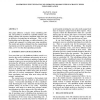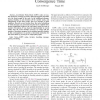511 search results - page 16 / 103 » Analysis of Multi-Organization Scheduling Algorithms |
104
Voted
IPPS
2007
IEEE
15 years 8 months ago
2007
IEEE
Consider the problem of scheduling a set of sporadically arriving tasks on a uniform multiprocessor with the goal of meeting deadlines. A processor p has the speed Sp. Tasks can b...
106
click to vote
ICALP
2009
Springer
16 years 2 months ago
2009
Springer
In the interference scheduling problem, one is given a set of n communication requests described by sourcedestination pairs of nodes from a metric space. The nodes correspond to d...
116
click to vote
RTSS
1998
IEEE
15 years 6 months ago
1998
IEEE
We propose a unifying method for analysis of scheduling problems in real-time systems. The method is based on ACSR-VP, a real-time process algebra with value-passing capabilities....
100
Voted
WSC
2008
15 years 4 months ago
2008
This paper addresses a surgery rooms scheduling problem. The problem is modeled as a parallel machine scheduling problem with sequence dependent setup times and an objective of mi...
122
click to vote
TIT
2008
15 years 1 months ago
2008
Abstract--Low-Density Parity-Check (LDPC) codes are usually decoded by running an iterative belief-propagation algorithm over the factor graph of the code. In the traditional messa...



